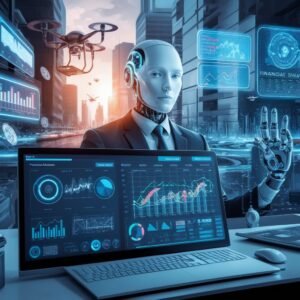Artificial Intelligence (AI) has come a long way from its conceptual beginnings to the powerful technology we know today. This evolution has been driven by the relentless pursuit of emulating human intelligence. In this article, we’ll take a journey through the history of AI, from its early foundations to the current era of deep learning.
The Early Foundations: Symbolic AI
The birth of AI can be traced back to the 20th century when mathematicians and philosophers like Alan Turing and John McCarthy began developing the foundational concepts. Key milestones include:
1. Alan Turing’s Theoretical Framework (1936)
Alan Turing’s work laid the theoretical foundation for machine intelligence. His concept of the Turing machine, a theoretical device that could simulate any algorithmic computation, set the stage for future AI development.
2. Dartmouth Workshop (1956)
John McCarthy organized the Dartmouth Workshop, a seminal event that marked the birth of AI as a field. Participants discussed topics like problem-solving, learning, and natural language processing.
3. Early AI Programs (1950s and 1960s)
Early AI programs, such as the Logic Theorist and General Problem Solver, aimed to simulate human reasoning and problem-solving using symbolic logic and rules.
The AI Winter: Knowledge-Based Systems
The early enthusiasm for AI was tempered by the “AI winter,” a period of reduced funding and progress. During this time, AI researchers turned to knowledge-based systems, which used databases of expert knowledge to solve problems. While this approach had some successes, it had limitations in handling uncertainty and learning.
The Rise of Machine Learning: Neural Networks and Expert Systems
In the 1980s and 1990s, AI saw a resurgence with the development of neural networks and expert systems.
1. Neural Networks
Neural networks, inspired by the structure of the human brain, allowed computers to learn from data. Backpropagation, an algorithm for training neural networks, played a crucial role in their revival.
2. Expert Systems
Expert systems combined knowledge representation with rule-based reasoning, making them suitable for tasks like medical diagnosis and financial analysis.
The Era of Big Data and Deep Learning
The turning point for AI came with the advent of big data and more powerful computing. This led to the resurgence of neural networks and the emergence of deep learning.
1. Deep Learning
Deep learning, a subset of machine learning, uses artificial neural networks with multiple layers (deep neural networks) to model complex patterns in data. Convolutional Neural Networks (CNNs) revolutionized image recognition, while Recurrent Neural Networks (RNNs) excelled in sequence data processing.
2. Big Data
The availability of vast amounts of data, coupled with cloud computing, allowed deep learning models to be trained on large datasets, resulting in remarkable progress in various AI applications.
3. AI in the Real World
AI is now part of our daily lives, from virtual assistants like Siri and Alexa to recommendation systems on streaming platforms. It’s used in autonomous vehicles, healthcare (diagnosis and drug discovery), and finance (fraud detection and algorithmic trading).
The Future of AI: Challenges and Opportunities
The future of AI holds incredible promise, but it also comes with challenges:
- Ethical Concerns: AI raises ethical questions related to privacy, bias in algorithms, and AI’s impact on employment.
- Explainability: Deep learning models can be opaque, making it essential to develop methods for understanding and explaining their decisions.
- AI Safety: Ensuring that AI systems behave safely and predictably is vital to prevent unintended consequences.
- AI in Healthcare: AI has the potential to revolutionize healthcare, from personalized medicine to telemedicine.
- AI in Climate and Energy: AI can play a significant role in addressing climate change and optimizing energy consumption.
Conclusion
The evolution of AI from its theoretical beginnings to the era of deep learning has been a journey marked by innovation, setbacks, and resurgence. AI is now an integral part of our world, and its future holds exciting opportunities and challenges. As we move forward, it’s crucial to ensure that AI is developed and deployed responsibly and ethically, harnessing its potential for the benefit of society.






